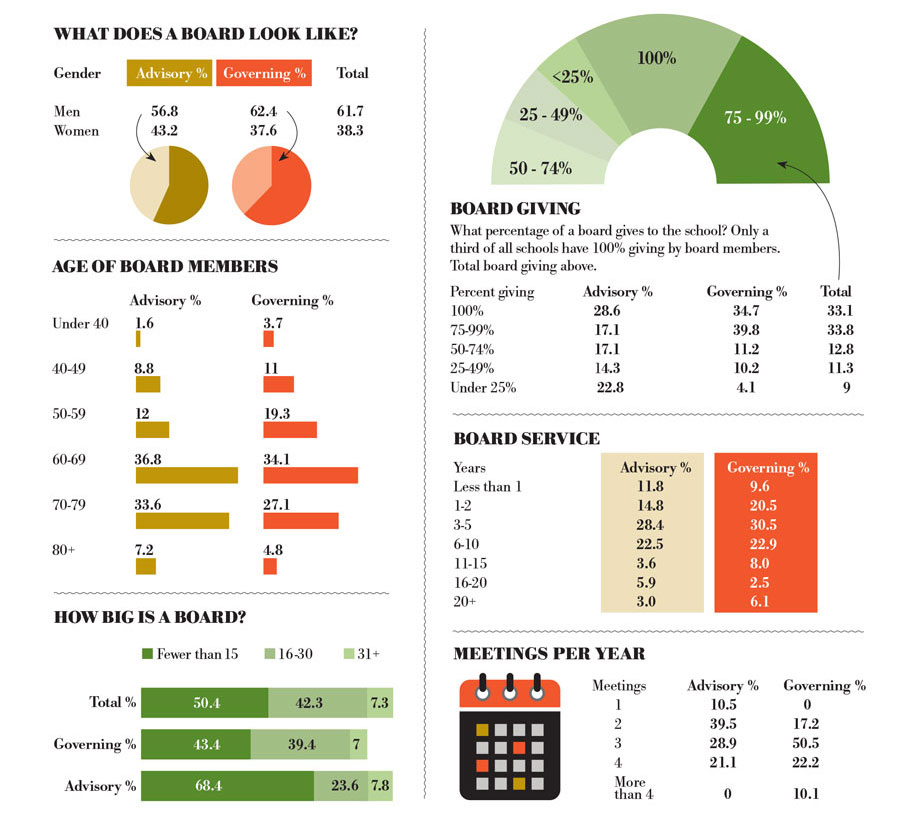
Illustrations by Helena Pallares
This year, the In Trust Center commissioned the first study of governing and advisory boards in theological education in more than a decade.
More than 70% of ATS-accredited schools responded, including more than 1,200 members of governing and advisory boards and 140 executive leaders.
This study is part of the In Trust Center’s multi-year Governance Initiative, which kicked off this year. The study will help pave the way for other research, programmatic work, and support for theological schools.
“This is a great first step in our Governance Initiative,” said Amy Kardash, president of the In Trust Center. “The data and analysis that will result from this study will provide a greater understanding of the field and a deeper knowledge about how boards are structured and the models and modes in which they do their work.”
The survey data is still being analyzed and includes several open-ended questions, which will help deepen understanding and lead to qualitative research. The initial results show an increase in the number of women on boards of theological schools since 2012, and the data indicates that the overall size of boards has decreased.
The In Trust Center survey is the first study of theological school boards since a 2012 study by the Auburn Center for the Study of Theological Education. That study had a response rate of 74%.
In addition to numbers listed in the Census (see page 13), the In Trust Center study showed:
- 33% of board members, both advisory and governing, were over the age of 70, and 14% were under the age of 50. The Auburn survey showed that 29% of boards were over 70 and just 8% were under 50.
- 43.5% of governing boards have 15 or fewer people, as did 68.4% of advisory boards. The Auburn study showed the average size of a board in 2012 was 23 people.
- 30.1% of governing board members had fewer than two years of service; 60% had fewer than five.
- 50.5% of governing boards met three times a year, 32.3% met four times or more, and 50% of advisory boards met twice or less a year.

Kardash noted that this study comes at an important time in theological education. Data by the Association of Theological Schools (ATS) showed that senior leaders’ tenure – those of presidents and chief academic officers – has decreased in recent years.
In 2021, the average term of a president was about six years, while the average term of a chief academic officer in ATS-accredited schools was about five years.
The field also has undergone tremendous turnover in senior leaders. ATS pointed out that between 2017 and 2022, there were 406 transitions among CEOs, either presidents or executive deans at embedded schools, and chief academic officers.
This has happened as schools face increased pressure from declining enrollments, denominational declines, changing student needs, and stress on resources, including endowments.
Kardash said she believes the research will allow the In Trust Center to support and even direct boards with what the research reveals in new ways.
“We are getting to the heart of these issues by focusing on what’s most needed at this time – strong boards, both governing and advisory – good governance,” Kardash said.
The work of the Governance Initiative will help address the needs and trends to provide the level of leadership and institutional support to help schools respond well and appropriately, she said.
“We’re committed to our mission of strengthening theological schools and the results of this study will provide ongoing opportunities to better equip boards as they steward their own institutional mission,” Kardash said.
She added that part of the In Trust Center’s support includes a commitment to share research data and information – including findings on models, modes, and practices of boards – as they become available. Information will be shared in a few ways, including on the website at intrust.org.
The Census
The State of Boards: A First Look
The In Trust Center commissioned a study this year, surveying leaders and members of advisory and governing boards of ATS-accredited schools about their composition and work. It’s the first study of board work since the Auburn Seminary’s 2012 survey, and 71% of ATS accredited schools responded. Here’s a first look at results of the survey.

Infographic by MS Jones NYC
You can find more about the Governance Initiative at: iintrust.org.